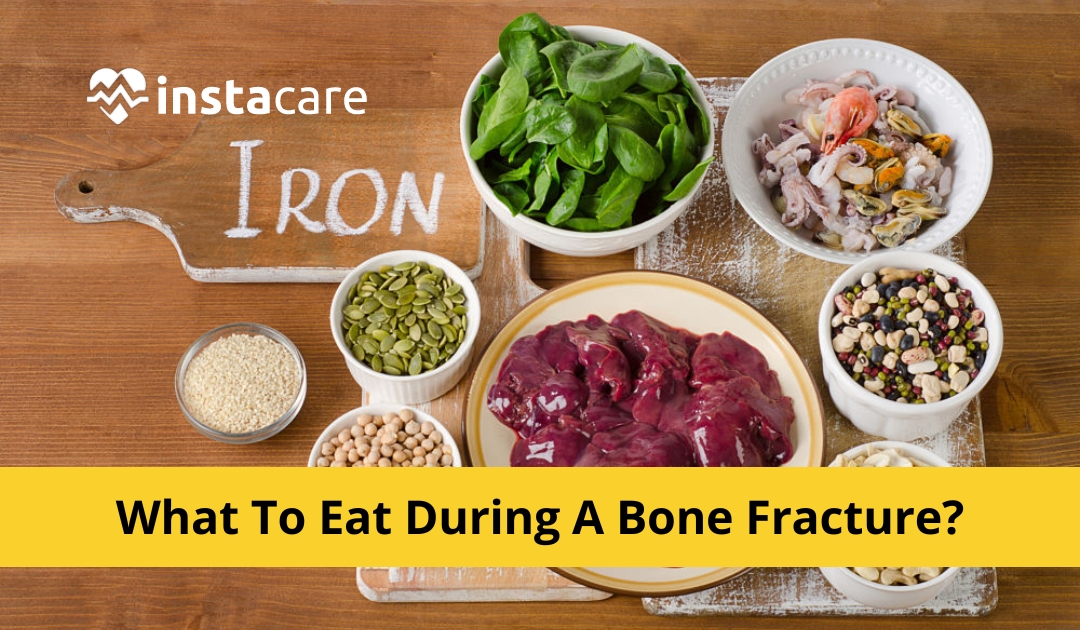Are you suffering from a bone fracture? Recovering from a
bone fracture can be time-consuming and painful, but what's even more
challenging is knowing what to eat during a broken bone. Eating the right foods
can help reduce pain and ensure proper healing of your bones during recovery.
In this blog post, we'll walk through some essential tips on how to plan meals
for optimum nutrition and healing when you have a fractured hip or other
fractures in the body. We'll discuss which nutrients are important to include
in your diet, nutrient-rich food choices, meal planning strategies specifically
tailored towards healing broken bones and offer some helpful recipes that make
eating healthy easier while recovering from injury!
Why is good food important to heal a broken bone?
Good food plays a crucial role in the healing process of broken bones. When a bone is fractured, the body requires more energy and nutrients to initiate the repair and regeneration process. By consuming wholesome and healthy foods, you provide your body with the necessary building blocks to promote bone healing. Foods rich in calcium, such as dairy products and leafy greens, can help strengthen weak bones and speed up recovery time.
Vitamin d, which is mainly found in fatty fish and egg yolks, is essential in
helping your body absorb calcium. Additionally, protein and vitamin c, both
found in foods such as chicken, turkey, fish, nuts, and citrus fruits, provide
the necessary materials to repair damaged tissues. Remember, good nutrition is
fundamental to the healing process and can ultimately lead to a quicker
recovery time for your broken bone.
How good nutrition helps in healing a bone?
A balanced diet plays a critical role in the healing process of a bone. Good nutrition provides the necessary macro- and micronutrients that aid in bone repair and growth. Nutrients such as calcium, vitamin d, phosphorus, and magnesium are essential for the strength and denseness of bones. Protein, on the other hand, assists in the formation of bone cells and collagen production, which is crucial in supporting the healing process.
Additionally,
incorporating anti-inflammatory compounds such as omega-3 fatty acids found in
fish, nuts, and seeds can help reduce inflammation and swelling, promoting
faster recovery. Eating a nutritious diet also helps maintain a healthy body
weight, reducing the strain on the bones and joints, which can aid in the
healing process. Therefore, ample nutrition is vital in helping a bone heal
properly and quickly, and it's essential to take care of your diet when
experiencing a bone injury or fracture.
Foods to eat during a bone fracture
1- Dairy
Dairy products are a crucial part of our diet and are consumed worldwide. While many are familiar with popular dairy items like cheese, milk, and cream, dairy products can range from yoghurt and butter to ice cream and whey. Not only do they provide us with essential vitamins and minerals like calcium, vitamin d and potassium, but they also help maintain a healthy weight and prevent chronic diseases. However, it is essential to choose low-fat and low-sugar options while consuming dairy products. So, whether you enjoy dairy in your coffee, cereal, or smoothies, make sure to incorporate them into your daily diet to reap their numerous health benefits.
2- Soy milk
Soy milk, derived from soybeans, is a popular non-dairy milk alternative for those who are lactose intolerant or vegan. Not only does it provide a creamy and smooth taste, but it also offers numerous health benefits. Soy milk is rich in protein, fiber, vitamins, and minerals such as calcium and potassium. It also contains antioxidants that can reduce the risk of cancer, heart disease, and other chronic illnesses.
Drinking soy milk can also improve
bone density and reduce menopausal symptoms in women. With its versatility, soy
milk can be used in various recipes, from smoothies to baked goods. Next time
you're in the grocery store, consider giving soy milk a try as a tasty and
nutritious dairy-free option.
3- Pumpkin seeds
Pumpkin seeds, also known as pepitas, are one of the most nutritious snacks out there. They are packed with protein, fiber, healthy fats, and an array of vitamins and minerals including iron, magnesium, zinc, and potassium. Besides their impressive nutritional profile, pumpkin seeds are also versatile and enjoyable to eat.
They can be roasted and seasoned with savory spices for a crunchy snack, or added to baked goods like bread and granola for extra crunch and texture. They can even be blended into a creamy, nutty spread similar to peanut butter. So next time you carve up a pumpkin, don't toss out those seeds. Instead, give them a good rinse, roast them up, and enjoy all the health benefits and delicious flavor that pumpkin seeds have to offer.
4- Bell peppers
Bell peppers, also known as sweet peppers or capsicums, are a common ingredient found in cuisines all over the world. These vibrant, colorful vegetables come in a range of hues, including green, red, yellow, and orange. Bell peppers are low in calories, high in fiber, and packed with vitamins, making them an excellent addition to any diet.
They are also
versatile and can be eaten raw or cooked, sliced thinly or chopped finely.
Whether you're tossing them in a salad, stuffing them with rice and meat, or
sautéing them with other veggies, bell peppers add a burst of flavor and
nutrition to any dish. With their appeal both to the eyes and taste buds, bell
peppers are a vegetable that truly delivers on all fronts.
5- Black beans
Black beans, also known as turtle beans or frijoles negros, are a staple ingredient in latin american cuisine. They are small, oval-shaped beans with a shiny, black coat and a creamy white center. One of the healthiest sources of protein, black beans are rich in fiber, iron, and antioxidants.
They
also have a low glycemic index, making them an ideal food for people with
diabetes or those trying to regulate their blood sugar levels. Black beans are
versatile and can be used in a variety of dishes, from soups and stews to
salads and dips. They add a hearty, earthy flavor to any meal and make for a
filling and nutritious addition to any diet.
6- Meat
Meat is a staple in many diets and is a great source of protein. It comes in many forms, from beef to chicken to pork, and can be prepared in countless ways. However, it is important to consider the quality of meat when purchasing and consuming it. Grass-fed and organic meats are often considered healthier options as they are free from antibiotics and added hormones.
Additionally, incorporating plant-based proteins into meals can
provide a range of health benefits as well. Overall, meat can be a nutritious
and delicious addition to meals, but it is important to make informed choices
about the source and preparation of it.
7- Sardines
Sardines are small, oily fish that are packed with nutrients despite their petite size. These little fishes are an excellent source of protein, omega-3 fatty acids, vitamins, and minerals. In fact, just a single serving of sardines contains over half of the recommended daily intake of vitamin b12, which plays a crucial role in maintaining healthy nerve cells and blood cells.
Sardines also boast high levels of selenium which is known to have
antioxidant and anti-inflammatory properties. What's more, adding sardines to
your diet can be an environmentally-friendly choice since they are abundant and
can be caught without endangering the ocean's ecosystems. So why not try
incorporating these superfoods into your next meal?
8- Fatty fish
Fatty fish is more than just a tasty seafood option. It is also rich in omega-3 fatty acids, which have numerous health benefits. These fatty acids are essential for brain function and can reduce the risk of developing depression and dementia. Fatty fish, such as salmon, tuna, and mackerel, is also known for its ability to reduce inflammation in the body.
This is because of the high levels of eicosapentaenoic acid (epa) and
docosahexaenoic acid (dha) found in these fish. Additionally, the consumption
of fatty fish may help lower the risk of heart disease and stroke due to its
ability to lower blood pressure and triglycerides. So, not only is fatty fish
delicious, it can also provide numerous health benefits.
9- Kale
Kale, also known as the "queen of greens," has been gaining popularity in recent years due to its high nutrient content and versatility in cooking. This leafy green powerhouse is packed with vitamins a, c, k, and minerals such as iron, calcium, and potassium. It is also a great source of fiber and antioxidants, making it a smart addition to any diet.
Kale
can be enjoyed in a variety of ways, whether it's sautéed, grilled, added to
soups and stews, or blended into smoothies. Including kale in your meals can
help support a healthy immune system, promote digestion, and even aid in weight
loss. So next time you're browsing the produce aisle, consider adding some kale
to your shopping cart for a nutritious boost to your meals.
10- Eggs
Eggs are a staple food in many households and for good reason. Not only are they delicious, but they are also incredibly nutritious. Eggs are an excellent source of protein, vitamins, and minerals, making them a great addition to any meal. They are also incredibly versatile and can be cooked in a variety of ways, from boiled to scrambled to poached.
Whether
you're making an omelet for breakfast or adding a hard-boiled egg to your lunch
salad, eggs are a great way to add flavor and nutrition to your diet. So if
you're looking for a healthy and delicious food to add to your meals, look no
further than eggs.
11- Grapes
Grapes, the juicy and sweet fruit that many of us love, are not only delicious but also packed with health benefits. These small, bite-sized fruits are a good source of vitamins and minerals, with vitamin c, vitamin k, and potassium being the most prominent. Grapes are also high in fiber and antioxidants, which help prevent chronic diseases like cancer and heart disease.
Studies have shown that consuming grapes regularly can improve
brain function and enhance memory, making them an excellent snack for students
and professionals alike. With so many health benefits, there's no reason why we
shouldn't grab a handful of grapes as a healthy snack option.
12- Parsley
Parsley is a versatile herb that has been used in cooking and medicine for centuries. Its fresh and bright flavor profile makes it the perfect addition to many dishes like soups, stews, salads, and marinades. But parsley is not just delicious; it's also packed with nutrients. It's an excellent source of vitamin k, vitamin c, and folate, which play crucial roles in bone health, immune function, and cell growth.
Parsley is also rich in
antioxidants, which may help reduce the risk of chronic diseases. Additionally,
parsley has diuretic properties, meaning it can help flush excess water and
toxins from the body. So next time you're at the grocery store, don't forget to
grab a bunch of parsley. Your taste buds and body will thank you.
13- Poultry
Poultry is a term that refers to domesticated birds that are raised for their meat and eggs. The most common types of poultry are chickens, turkeys, ducks, and geese. These birds have been domesticated for thousands of years and have become an essential source of protein for humans around the world. In the united states alone, over 9 billion chickens are raised each year for meat and eggs.
Poultry is known for being a lean protein source and can be
prepared in a variety of ways, making it a versatile ingredient in many
different cuisines. When buying poultry, it's important to look for quality and
freshness, as well as consider the welfare of the birds it came from. By
choosing ethically sourced poultry, you can support sustainable and humane farming
practices.
The importance of getting adequate amounts of calcium, vitamin d and protein
Calcium, vitamin d, and protein are all vital to our overall health and well-being. Calcium is crucial for strong bones and teeth, while vitamin d helps our bodies absorb and utilize calcium efficiently. Protein is essential for building and repairing tissues and ensuring proper growth and development. It is important to make sure we are getting enough of these nutrients in our diets, especially as we age.
Calcium and vitamin d can be
found in dairy products, leafy greens, and supplements, while protein can be
found in meat, fish, eggs, and beans. By making sure we are getting adequate
amounts of these nutrients, we can promote good health and prevent diseases such
as osteoporosis and muscle wasting. So let's prioritize our nutrition and give
our bodies the support they need to thrive!
Foods that are high in calcium, vitamin d, and protein
Calcium, vitamin d, and protein are essential nutrients that our bodies need to function properly. When it comes to food, there are plenty of choices out there for those looking to boost their intake of these important nutrients. Foods like milk, cheese, yogurt, and tofu are excellent sources of calcium, while salmon and egg yolks provide ample amounts of vitamin d.
If
you're looking to up your protein intake, options like chicken, beef, fish, and
beans are great choices. By incorporating these foods into your diet, you can
ensure that your body is getting the nutrients it needs to stay healthy and
strong.
Foods to avoid because they can interfere with healing
When it comes to healing an injury or illness, certain foods can actually interfere with the process. It's important to be mindful of what you're putting into your body during this time. One food to avoid is processed snacks like chips and crackers. These often contain high amounts of sodium and unhealthy fats, which can lead to inflammation in the body. Another food to steer clear of is sugary drinks, such as soda and sweetened tea.
These
beverages can spike blood sugar levels, which can impede the healing process.
Lastly, it's wise to limit your intake of alcohol. Not only does it dehydrate the
body, but it can also weaken the immune system, making it harder for your body
to fight off infections. By avoiding these foods, you can give your body the
best chance at healing properly.
Conclusion
Suffering from a bone fracture can be extremely overwhelming and disheartening. It's important, however, to stay focused on your recovery and maintain a positive mindset throughout the process. Additionally, it is just as important to ensure you are getting the proper nutrients your body needs while healing. While having a bone fracture may limit the type of food you should consume due to health restrictions, there are still plenty of delicious meals and snacks that are beneficial for your recovery.
Eat balanced
meals with lots of protein, healthy fats, and complex carbohydrates in addition
to lots of fruits and vegetables. A nutrient-packed diet will help speed up
your body’s healing process through adequate tissue regeneration for stronger
bones down the road. Taking necessary steps like these will leave you feeling
energized rather than depleted throughout your recuperation period!
Please book an appointment with the best nutritionist in lahore, karachi, islamabad, and all major cities of pakistan through instacare, or call our helpline at 03171777509 to find a verified doctor for your disease.











